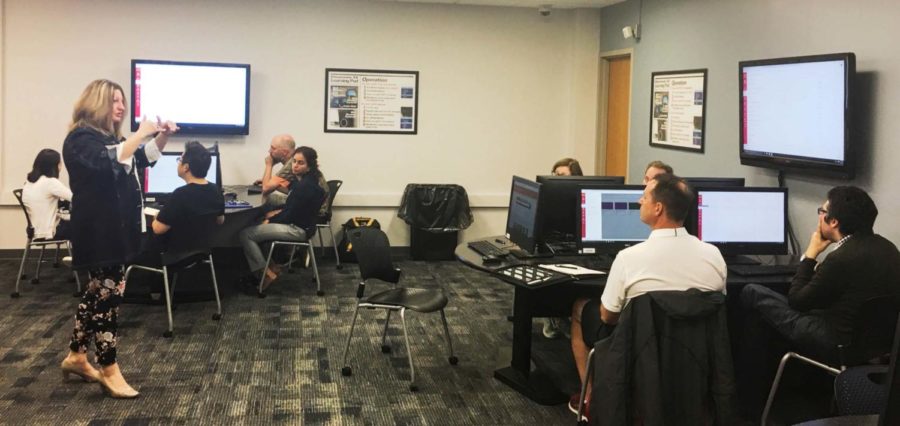CELT hires two new faculty fellows
Lesya Hassall, instructional development specialist, taught a “Course Design in Canvas” workshop Oct. 22, 2017, at Parks Library.
December 5, 2019
The Center for Excellence in Learning and Teaching (CELT) has hired two new faculty fellows.
Clark Coffman and Rob Whitehead have different responsibilities within CELT, as they are the newest faculty fellows.
Coffman, an associate professor in genetics, development and cell biology, is CELT’s graduate student and postdoctoral professional development faculty fellow, and Whitehead, an associate professor in architecture, is the high-impact practices fellow. Both of the appointments are half-time and began this summer, lasting three and two years, respectively.
Whitehead’s role centers around three initiatives: service learning, project-based learning and open educational resources.
Service-learning curriculum incorporates community service into course instruction.
“Service learning happens across all of the colleges in many different ways, but currently there is no common way to designate what courses are service-learning courses,” Whitehead said. “One of my responsibilities is to get a group of people together who are doing service learning around campus and try to have us teach and learn from each other.”
Whitehead also is coordinating project-based learning, focusing on different ways courses or activities can be taught.
“It is essentially the idea of brainstorming, testing and implementing,” Whitehead said. “This happens all over in architecture, engineering, ag and business. It often happens in capstone classes all around campus, but before this fellowship, there was no common practice.”
In addition, Whitehead will serve as CELT’s lead on open educational resources, which includes the Miller Open Education Mini-Grants.
Coffman directs CELT’s four-course preparing future faculty program designed for graduate and postdoctoral students pursuing faculty careers. Participants are aided throughout the process by self-chosen faculty mentors who are not their thesis advisers.
The first semester-long course covers the expectations of what faculty encounter at different institutions, from community colleges to top research universities. Participants create and edit cover letters, research statements and vitae.
“We have faculty panels come in from a whole spectrum of institutions and talk about what faculty life is like, what the promotion and tenure process is like and how to put together an application,” Coffman said. “We tell the students this course really is about finding your fit.”
The next course continues work on job materials, such as diversity statements, but shifts focus to pedagogy. The third class provides teaching experience that could include teaching a section of a mentor’s course. The final class is an independent study that can range from preparing research grants to portfolio development.
The program could be completed in a semester and a half, as some courses can be taken simultaneously.
Participants who complete the first two courses earn the designation of a preparing future faculty associate. Those who complete three courses are fellows, while finishing all four earns them the label of scholar. The levels of distinction can be beneficial when trying to land a first job.
Seventy students enrolled in the first course this fall. Coffman is assisted by CELT program coordinator Karen Bovenmyer, who has helped guide 961 students through the program since its inception in 2002.
Coffman and Bovenmyer also work closely with the Center for the Integration of Research, Teaching, and Learning (CIRTL) on campus, a national program focused on effective teaching practices in higher education.
Coffman also collaborates with the School of Education’s graduate student teaching certificate program aimed at graduate students looking to become professors.

















